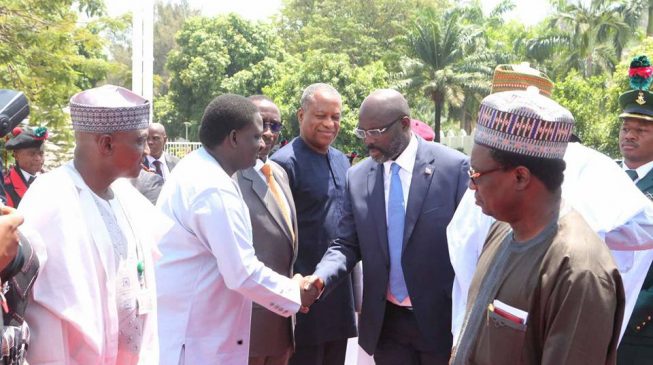
President George Weah of Liberia says his country needs at least 6,000 teachers from Nigeria.
Weah said this on Monday when he visited President Muhammadu Buhari at the presidential villa in Abuja.
Admitting that the economy of Liberia is dwindling, Weah said his country needs Nigeria’s private sector to remain afloat.
The Liberian leader blamed the economic crisis on falling prices of the country’s major exports and “unfavourable foreign exchange rate”.
“The prices of our two basic export commodities, rubber and iron ore, continue to fall on the world diminished market our foreign exchange earnings from the export of these and other commodities are used mainly on the importation of food and other commodities, causing massive trade deficits; youth unemployment is at an all-time high, and prices of basic commodities continue to increase,” he said.
“Our people have voted for change, and for hope. And change is finally here. But mere political change is meaningless without development, prosperity, and growth Your Excellency, we need Nigeria’s help to jump-start our economy.
“Your sustained technical assistance for capacity building in these sectors is most welcome. For example, Nigerian teachers and medical volunteers to Liberia, under the Technical Aid Corps (TAC) Agreement with Liberia, have been very crucial in boosting capacity development in Liberia, and it is my hope that this assistance can be considerably increased to address with urgency our most pressing socio-economic needs at this time.
“More specifically, under the Bilateral Teacher Exchange programme, we are seeking 6,000-plus teachers to make up for the shortage of good teachers in our educational system.
“In agriculture, we are seeking experts and extension workers to build capacity in the sector, particularly with crops, (such as cassava, for example,) which lend themselves readily to value- added propositions and export earning potential.”
Weah thanked Nigeria for restoring peace to Liberia and helping reform Liberian military after the country’s civil war.
He also invited Nigerian investors to avail themselves of the opportunities in Liberia and appealed to Nigerian banks thinking of relocating from Liberia not to do so, promising that his administration would revamp the economy for the benefit of investor.
“Liberia is now open for business to the Nigerian private sector. There is a need to address the current volume of trade between our two countries, which is very low and does not exceed $5 million, by some estimates,” he said.
“Yet, the Liberian banking sector is dominated by Nigerian banks, and I am made to understand that their head offices in Nigeria may be considering reducing their support or even shutting them down because of the recent downturn in our economy. If this is true, l urge them not to do so, as l am optimistic that trade and commerce will increase in the near future.
“There are also major shortcomings in the electricity and power sectors, in road construction, in housing, in mining, and in fisheries, to name a few, that could be of serious interest to Nigerian investors, either as individuals or companies or through joint-ventures or public-private partnerships.”
Comments